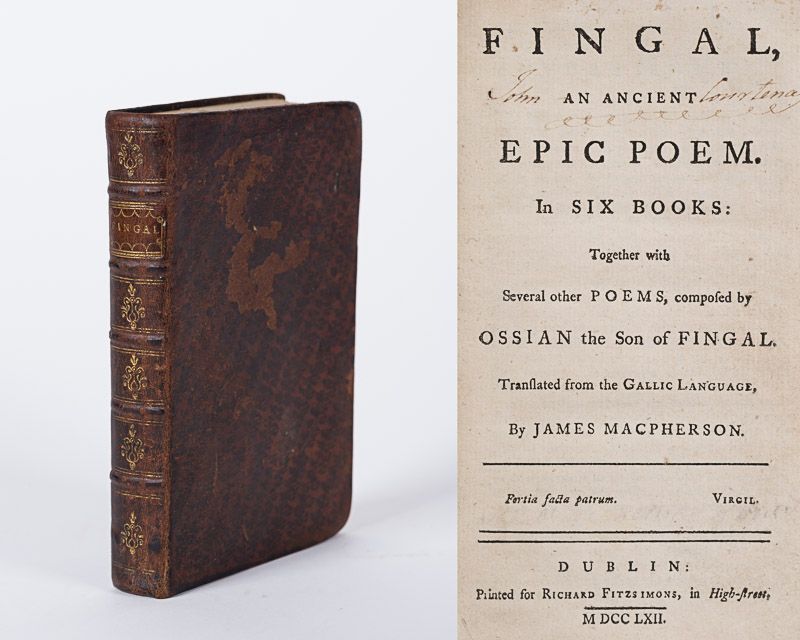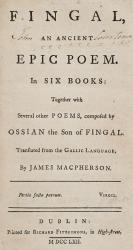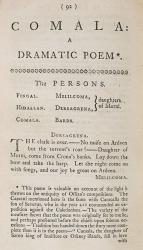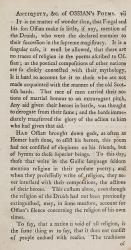MacPherson, Fingal, An Ancient Epic Poem in Six Books : Together with several ot
Fingal, An Ancient Epic Poem in Six Books : Together with several other Poems, composed by Ossian the Son of Fingal. Translated from the Gallic [Gaelic] Language by James MacPherson.
First Edition. Dublin, Printed for Richard Fitzsimons in High-Street, 1762. Small Octavo. [8], XX, 304 pages. Hardcover / Original 18th century full leather with original spine-label. Binding slightly rubbed but in firm condition. Some very minor paper-defects to endpaper. Overall in very good condition with only minor signs of wear. From the library of one “John Courtenay”, with his name in ink on the titlepage. This is possibly John Courtenay (22 August 1738 – 24 March 1816), who was an Irish officer in the British Army, later becing a politician in England. He was a Whig member of Parliament (MP) at Westminster from 1780 to 1807, and again in 1812. (Wikipedia)
Includes the following chapters:
Fingal, an Epick Poem / Comala – a Dramatic Poem / The War of Caros – a Poem / The War of Inis-Thoma – a Poem / The Battle of Lora – a Poem / Conlath and Cuthona – a Poem / Carthon – a Poem / Temora – an Epic Poem / Carric-Thura – a Poem / The Songs of Selma / Calthon and Colmal – a Poem / Lathmon – a Poem / Oithona – a Poem / Croma – a Poem / Berrathon – a Poem //
James Macpherson (Gaelic: Seumas MacMhuirich or Seumas Mac a’ Phearsain; 27 October 1736 – 17 February 1796) was a Scottish writer, poet, literary collector, and politician. He is known for the Ossian cycle of epic poems, which he claimed to have discovered and translated from Gaelic.
Includes “A Dissertation concerning the Antiquity, &c. of the Poems of Ossian the Son of Fingal” //
Macpherson was born at Ruthven in the parish of Kingussie in Badenoch, Inverness-shire. This was a Scottish Gaelic-speaking area but near the Ruthven Barracks of the British Army, established in 1719 to enforce Whig rule from London after the Jacobite uprising of 1715. Macpherson’s uncle, Ewen Macpherson joined the Jacobite army in the 1745 march south, when Macpherson was nine years old and after the Battle of Culloden, had had to remain in hiding for nine years. In the 1752-3 session, Macpherson was sent to King’s College, Aberdeen, moving two years later to Marischal College (the two institutions later became the University of Aberdeen), reading Caesar’s Commentaries on the relationships between the ‘primitive’ Germanic tribes and the ‘enlightened’ Roman imperial army; it is also believed that he attended classes at the University of Edinburgh as a divinity student in 1755–56. During his years as a student, he ostensibly wrote over 4,000 lines of verse, some of which was later published, notably The Highlander (1758), a six-canto epic poem, which he attempted to suppress sometime after its publication.
In 1761, Macpherson announced the discovery of an epic on the subject of Fingal supposedly written by Ossian, which he published in December. Like the 1760 Fragments of Ancient Poetry, it was written in musical measured prose. The full title of the work was Fingal, an Ancient Epic Poem in Six Books, together with Several Other Poems composed by Ossian, the Son of Fingal, translated from the Gaelic Language. The narrative was related to the Irish mythological character Fionn mac Cumhaill/Finn McCool. The figure of Ossian was based on Fionn’s son Oisín. Fingal takes his name from Fionnghall, meaning “white stranger”. Another related poem, Temora, followed in 1763, and a collected edition, The Works of Ossian, in 1765.
The authenticity of these so-called translations from the works of a 3rd-century bard was immediately challenged by Irish historians, especially Charles O’Conor, who noted technical errors in chronology and in the forming of Gaelic names, and commented on the implausibility of many of Macpherson’s claims, none of which Macpherson was able to substantiate. More forceful denunciations were later made by Samuel Johnson, who asserted (in A Journey to the Western Islands of Scotland, 1775) that Macpherson had found fragments of poems and stories, and then woven them into a romance of his own composition. Further challenges and defences were made well into the nineteenth century, but the issue was moot by then. Macpherson’s manuscript Gaelic “originals” were published posthumously in 1807; Ludwig Christian Stern was sure they were in fact back-translations from his English version. (Wikipedia)
- Keywords: 18th Century – Rare · Catalogue Irish History Ten – Irish Literature Before 1900 · Catalogue No.10 – International Literature · Literature – Rare · Scotland · Scottish History Rare · Scottish Literature
- Language: English
- Inventory Number: 31347AB
EUR 480,--
© 2024 Inanna Rare Books Ltd. | Powered by HESCOM-Software















